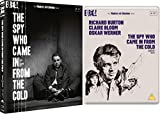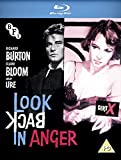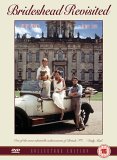![Clash Of The Titans [1981]](/pictures/1035175.jpg) Clash Of The Titans | DVD | (17/04/2019)
from £6.67
| Saving you £6.32 (94.75%)
| RRP
Clash Of The Titans | DVD | (17/04/2019)
from £6.67
| Saving you £6.32 (94.75%)
| RRP Experience The Fantastic! You've visited lands where a Cyclops roams (The 7th Voyage of Sinbad) skeletons duel (Jason and the Argonauts) and cowboys lasso dinosaurs (The Valley of Gwangi). They are the worlds of Ray Harryhausen the stop motion effects master who creates another dazzling realm in Clash of the Titans. Olympian gods mythological monsters and heroic mortals populate this imaginative spectacle. Harry Haml
![Brideshead Revisited - The Complete Collection (Digitally Remastered) [DVD]](/pictures/1109822.jpg) Brideshead Revisited - The Complete Collection (Digitally Remastered) | DVD | (12/09/2011)
from £17.98
| Saving you £-5.74 (N/A%)
| RRP
Brideshead Revisited - The Complete Collection (Digitally Remastered) | DVD | (12/09/2011)
from £17.98
| Saving you £-5.74 (N/A%)
| RRP Digitally Re-mastered for the very first time! Based on Evelyn Waugh's classic novel Jeremy Irons stars as Charles Ryder a disillusioned army captain who is moved to reflect on his languid days in the enchanted castle that was Brideshead home of the aristocratic Marchmain family whose acquaintance Charles made in the company of Oxford classmate the charming wild-child Sebastian. Anthony Andrews co-stars as the doomed Sebastian. Sebastian takes Charles under his wing but vows early on that he is not going to let Charles get mixed up with his family. But mixed up Charles gets! He becomes a friend and confidante not to mention a lover to Sebastian's sister Julia (Diana Quick). Meanwhile the self-destructive Sebastian's life spirals out of control. Brideshead Revisited boasts a distinguished ensemble cast including Laurence Olivier in his Emmy Award-winning role as the exiled Lord Merchmain Claire Bloom as Lady Merchmain and the magnificent John Gielgud as Charle's estranged father. Grand locations and a haunting musical score make this a memorable revisit of an irretrievable bygone era. Episodes comprise: 1. Et In Arcadia Ego 2. Home And Abroad 3. The Bleak Light Of Day 4. Sebastian Against The World 5. A Blow Upon A Bruise 6. Julia 7. The Unseen Hook 8. Brideshead Deserted 9. Orphans Of The Storm 10. A Twitch Upon A Thread 11. Brideshead Revisited
![The Haunting [Blu-ray] [2020] [Region Free]](/pictures/1151532.jpg) The Haunting | Blu Ray | (04/05/2020)
from £8.99
| Saving you £N/A (N/A%)
| RRP
The Haunting | Blu Ray | (04/05/2020)
from £8.99
| Saving you £N/A (N/A%)
| RRP It was an evil house form the beginning , a house that was born bad. The place is the 90-year-old mansion called Hill House. No one lives in there. Or so it seems. But come in. Because even if you don't believe in ghosts, there's no denying the terror of The Haunting. Robert Wise, returned to psychological horror for this much admired, first screen adaptation of Shirley Jackson's The Haunting of Hill House. Four people (Julie Harris, Claire Bloom, Richard Johnson and Russ Tamblyn) come to the house to study its supernatural phenomena. Or has the house drawn at least one of them to it? The answer will unnerve you in this elegantly sinister scare movie. It's good fun (Pauline Kael, 5001 Nights at the Movies).
![The Haunting [1963]](/pictures/1012266.jpg) The Haunting | DVD | (17/04/2019)
from £10.35
| Saving you £3.64 (35.17%)
| RRP
The Haunting | DVD | (17/04/2019)
from £10.35
| Saving you £3.64 (35.17%)
| RRP Certain to remain one of the greatest haunted-house movies ever made, Robert Wise's The Haunting (1963) is antithetical to all the gory horror films of subsequent decades, because its considerable frights remain implicitly rooted in the viewer's sensitivity to abject fear. A classic spook-fest based on Shirley Jackson's novel The Haunting of Hill House (which also inspired the 1999 remake directed by Jan de Bont), the film begins with a prologue that concisely establishes the dark history of Hill House, a massive New England mansion (actually filmed in England) that will play host to four daring guests determined to investigate--and hopefully debunk--the legacy of death and ghostly possession that has given the mansion its terrifying reputation. Consumed by guilt and grief over her mother's recent death and driven to adventure by her belief in the supernatural, Eleanor Vance (Julie Harris) is the most unstable--and therefore the most vulnerable--visitor to Hill House. She's invited there by anthropologist Dr. Markway (Richard Johnson), along with the bohemian lesbian Theodora (Claire Bloom), who has acute extra-sensory abilities, and glib playboy Luke Sanderson (Russ Tamblyn, from Wise's West Side Story), who will gladly inherit Hill House if it proves to be hospitable. Of course, the shadowy mansion is anything but welcoming to its unwanted intruders. Strange noises, from muffled wails to deafening pounding, set the stage for even scarier occurrences, including a door that appears to breathe (with a slowly turning doorknob that's almost unbearably suspenseful), unexplained writing on walls, and a delicate spiral staircase that seems to have a life of its own. The genius of The Haunting lies in the restraint of Wise and screenwriter Nelson Gidding, who elicit almost all of the film's mounting terror from the psychology of its characters--particularly Eleanor, whose grip on sanity grows increasingly tenuous. The presence of lurking spirits relies heavily on the power of suggestion (likewise the cautious handling of Theodora's attraction to Eleanor) and the film's use of sound is more terrifying than anything Wise could have shown with his camera. Like Jack Clayton's 1961 chiller, The Innocents, The Haunting knows the value of planting the seeds of terror in the mind, as opposed to letting them blossom graphically on the screen. What you don't see is infinitely more frightening than what you do, and with nary a severed head or bloody corpse in sight, The Haunting is guaranteed to chill you to the bone. --Jeff Shannon
![Daylight [1996]](/pictures/1000499.jpg) Daylight | DVD | (02/05/2005)
from £9.68
| Saving you £0.31 (3.20%)
| RRP
Daylight | DVD | (02/05/2005)
from £9.68
| Saving you £0.31 (3.20%)
| RRP This echo of 1970s disaster films stars Sylvester Stallone as the disgraced former head of New York City's Emergency Medical Services, a loser who is nevertheless a compulsive rescuer of people in danger. When the Holland Tunnel is sealed off after a fiery explosion and car passengers are trapped within, he goes inside and leads a group of survivors (a mixed group allegorically representing America's diversity) through all manner of pestilence toward safety. Directed by the imaginative Rob Cohen (Dragon: The Bruce Lee Story), Daylight finds Stallone outrageously (and to almost campy effect) pushing the envelope of his martyr persona to near-religious levels. He throws himself, quite literally, into this part and between that entertainment factor and the unnervingly convincing effects, this is a pretty watchable film.--Tom Keogh
 Crimes And Misdemeanors | DVD | (01/07/2002)
from £25.71
| Saving you £-9.72 (N/A%)
| RRP
Crimes And Misdemeanors | DVD | (01/07/2002)
from £25.71
| Saving you £-9.72 (N/A%)
| RRP Poignant penetrating and scathing hilarious Crimes and Misdemeanors is a deftly rendered tale about the complexity of human choices and the moral microcosm that they represent. Showcasing Allen’s brilliant grasp of the link between the funny and the fatal his nineteenth movie Crimes and Misdemeanors is one of the watershed films of his career. Cliff Stern (Woody Allen) is an idealistic filmmaker… until he is offered a lucrative job shooting a flattering profile of
 The Spy Who Came In From The Cold | Blu Ray | (17/05/2021)
from £12.55
| Saving you £N/A (N/A%)
| RRP
The Spy Who Came In From The Cold | Blu Ray | (17/05/2021)
from £12.55
| Saving you £N/A (N/A%)
| RRP The acclaimed, best-selling novel by John le Carré, about a Cold War spy on one final dangerous mission in East Germany, is transmuted by director Martin Ritt (Hud, Norma Rae) into a film every bit as precise and ruthless as the book. Academy Award-nominated Richard Burton (Who's Afraid of Virginia Woolf, Becket,1984) is superb as Alec Leamas, whose relationship with the beautiful librarian Nan, played by Claire Bloom (Hamlet, A Streetcar Named Desire), puts his assignment in jeopardy. Winner of 4 BAFTA Awards (including Best British Film) The Spy Who Came in from the Cold is a hard-edged and tragic thriller, suffused with the political and social consciousness that defined Ritt's career. The Masters of Cinema Series is proud to present the film on Blu-ray for the first time in the UK. Special Features Limited Edition Exclusive O-Card slipcase with new artwork by artist Grégory Sacré (Gokaiju) 1080p presentation on Blu-ray from a restored high-definition digital transfer Uncompressed LPCM Stereo audio Optional English SDH Brand new audio commentary with film scholar Adrian Martin Brand new video essay by critic and filmmaker David Cairns PLUS: A 48 PAGE collector's booklet featuring a new essay by Richard Combs; and a number of archival pieces and imagery
 Richard III | DVD | (06/02/2006)
from £7.99
| Saving you £7.00 (87.61%)
| RRP
Richard III | DVD | (06/02/2006)
from £7.99
| Saving you £7.00 (87.61%)
| RRP ""Why I can smile and murder while I smile And cry 'Content' to that which grieves my heart And wet my cheeks with artificial tears And frame my face to all occasions..."" Soon after Edward IV is crowned King his brother Richard a hunchback twisted in mind as well as body starts scheming for the throne of England. He woos and wins Lady Anne and then poisons Edward's mind against their brother Clarence later organising his death. But even after his coronation
 Limelight - Charlie Chaplin DVD | DVD | (28/09/2015)
from £N/A
| Saving you £N/A (N/A%)
| RRP
Limelight - Charlie Chaplin DVD | DVD | (28/09/2015)
from £N/A
| Saving you £N/A (N/A%)
| RRP Limelight tells the story of a fading music hall comedian's efforts to help a despondent ballet dancer learn both to walk and feel confident about life again. The highlight of this moving Academy Award-winning film is the classic duet with Chaplin's only real artistic film comedy rival Buster Keaton.
 The BBC TV Shakespeare Collection | DVD | (14/11/2005)
from £199.99
| Saving you £N/A (N/A%)
| RRP
The BBC TV Shakespeare Collection | DVD | (14/11/2005)
from £199.99
| Saving you £N/A (N/A%)
| RRP This mammoth box set includes the following BBC Shakespeare Adaptations: 1. Romeo And Juliet - Directed by Alvin Rakoff (1978) 2. Richard II - Directed by Jane Howell (1983) 3. As You Like It - Directed by Basil Coleman (1978) 4. Julius Caesar - Directed by Herbert Wise (1979) 5. Measure For Measure - Directed by Desmond Davis (1979) 6. Henry VIII - Directed Kevin Billington (1979) 7. Henry IV: Parts I & II - Directed by David Giles (1979) 8. Henry V: Parts I & II - Directed by Davi
![Look Back In Anger [DVD] [1959]](/pictures/1094745.jpg) Look Back In Anger | DVD | (31/08/2009)
from £N/A
| Saving you £N/A (N/A%)
| RRP
Look Back In Anger | DVD | (31/08/2009)
from £N/A
| Saving you £N/A (N/A%)
| RRP Look Back In Anger
![Hold The Dream - Barbara Taylor Bradford [1986]](/pictures/1019395.jpg) Hold The Dream - Barbara Taylor Bradford | DVD | (24/02/2003)
from £4.19
| Saving you £-2.20 (-110.60%)
| RRP
Hold The Dream - Barbara Taylor Bradford | DVD | (24/02/2003)
from £4.19
| Saving you £-2.20 (-110.60%)
| RRP In this second installment of the trilogy Emma Harte passes on the Harte business empire to her favourite grand-daughter Paula McGill Fairley who must strive to unite a warring family. This is the story of one woman's determination to find the passion and happiness that should be her rightful legacy.
![Alexander The Great [1955]](/pictures/1000915.jpg) Alexander The Great | DVD | (03/01/2005)
from £N/A
| Saving you £N/A (N/A%)
| RRP
Alexander The Great | DVD | (03/01/2005)
from £N/A
| Saving you £N/A (N/A%)
| RRP Richard Burton stars in Alexander the Great, a middling entry in the 1950s CinemaScope epic cycle. The film boasts excellent production values and a fine cast--including Frederic March, Claire Bloom, Harry Andrews, Stanley Baker, Peter Cushing and Michael Hordern--but it rarely comes to life other than as a big fat ancient Greek wedding of the talents of Burton and Bloom. They strike real dramatic sparks together, so much so they would be reunited in Look Back in Anger (1958) and The Spy Who Came in from the Cold (1965). The film's failures must be laid at the feet of writer, director and producer Robert Rossen, who never before or after helmed anything remotely on this scale; his best work would follow with the intimate The Hustler (1961). Rossen simply shows little sensibility for the epic, staging lavish but brief and rather pedestrian battles and somehow drawing from the usually mesmerising Burton a performance lacking the charisma essential to a great military commander. Burton fans can enjoy him at his epic best as Marc Anthony in Cleopatra (1963). On the DVD: Alexander the Great is presented anamorphically enhanced at 2.35:1, although the picture is still obviously cropped at either side of the screen throughout. The print is very variable, in places quite grainy and soft with some serious flickering blotchiness, but otherwise it has strong colours, detail and contrast. The sound is primitive stereo. The only extra is the theatrical trailer, effectively presented in anamorphic 2.35:1. --Gary S. Dalkin
 Laurence Olivier Shakespeare Collection | DVD | (30/07/2007)
from £14.99
| Saving you £65.00 (433.62%)
| RRP
Laurence Olivier Shakespeare Collection | DVD | (30/07/2007)
from £14.99
| Saving you £65.00 (433.62%)
| RRP Set Comprises: King Lear Henry V Hamlet Merchant of Venice Richard III As You Like It
![Brideshead Revisited [1981]](/pictures/1019230.jpg) Brideshead Revisited | DVD | (12/05/2003)
from £22.49
| Saving you £12.50 (55.58%)
| RRP
Brideshead Revisited | DVD | (12/05/2003)
from £22.49
| Saving you £12.50 (55.58%)
| RRP Fill a bowl with alpine strawberries, break out the Château Lafite (1899, of course) and bask in Brideshead Revisited, the 1981 miniseries based on Evelyn Waugh's classic novel, adapted for the screen by John Mortimer (Rumpole of the Bailey). In his breakthrough role, Jeremy Irons stars as Charles Ryder, a disillusioned Army captain who is moved to reflect on his "languid days" in the "enchanted castle" that was Brideshead, home of the aristocratic Marchmain family, whose acquaintance Charles made in the company of an Oxford classmate, the charming wild-child Sebastian. Anthony Andrews costars as the doomed Sebastian, whose beauty is "arresting" and "whose eccentricities and behaviour seemed to know no bounds". The "entitled and enchanted" Sebastian takes Charles under his wing ("Charles, what a lot you have to learn"), but vows early on that he is "not going to let [Charles] get mixed up with [his] family." But mixed up Charles gets. He becomes a friend and confidante, not to mention a lover, to Sebastian's sister Julia (Diana Quick). Meanwhile, the self-destructive Sebastian's life spirals out of control. Brideshead Revisited boasts a distinguished ensemble cast, including Laurence Olivier in his Emmy Award-winning role as the exiled Lord Marchmain, Claire Bloom as Lady Marchmain, and the magnificent John Gielgud as Charles's estranged father. Grand locations and a haunting musical score make this a memorable revisit of an irretrievable bygone era. --Donald Liebenson
![80,000 Suspects [DVD]](/pictures/1137453.jpg) 80,000 Suspects | DVD | (19/10/2015)
from £9.25
| Saving you £0.74 (8.00%)
| RRP
80,000 Suspects | DVD | (19/10/2015)
from £9.25
| Saving you £0.74 (8.00%)
| RRP Richard Johnson and Claire Bloom, multi-award-winning stars of The Haunting, headline this powerful romantic drama set against the backdrop of a smallpox epidemic in the city of Bath. One of BAFTA-winning director Val Guest's most memorable films, 80,000 Suspects is presented here in a brand-new transfer from the original film elements, in its as-exhibited theatrical aspect ratio. Dr Steven Monks suspects smallpox when he is asked to examine a patient with unusual symptoms. The diagnosis is quickly confirmed and the authorities mobilise to try to contain the outbreak, with Monks working tirelessly to prevent an epidemic. With his marriage on the verge of collapse, however, this personal crisis threatens to overshadow his vital work as the deadly disease moves ever closer to those he loves...
![Clash Of The Titans [Blu-ray] [1981]](/pictures/1097772.jpg) Clash Of The Titans | Blu Ray | (15/03/2010)
from £9.75
| Saving you £8.24 (84.51%)
| RRP
Clash Of The Titans | Blu Ray | (15/03/2010)
from £9.75
| Saving you £8.24 (84.51%)
| RRP Experience The Fantastic! You've visited lands where a Cyclops roams (The 7th Voyage of Sinbad) skeletons duel (Jason and the Argonauts) and cowboys lasso dinosaurs (The Valley of Gwangi). They are the worlds of Ray Harryhausen the stop motion effects master who creates another dazzling realm in Clash of the Titans. Olympian gods mythological monsters and heroic mortals populate this imaginative spectacle. Harry Hamlin is Perseus mortal son of Zeus (Laurence Olivier) and champion of captive Andromeda (Judi Bowker). From that storyline Harryhausen unleashes sea creature Kraken snake haired Medusa swamp denizen Calibos flying horse Pegasus two headed dog Dioskilos giant scorpions and all manner of eye popping adventure. Let the clash begin!
 Look Back in Anger (Blu-ray) | Blu Ray | (26/11/2018)
from £18.98
| Saving you £N/A (N/A%)
| RRP
Look Back in Anger (Blu-ray) | Blu Ray | (26/11/2018)
from £18.98
| Saving you £N/A (N/A%)
| RRP Shot by the great Oswald Morris (Fiddler on the Roof), Look Back in Anger opens with an extraordinary jazz-club scene. Trumpeter Jimmy Porter (Richard Burton) - a disillusioned, college-educated bloke, raging against the establishment - works by day on a sweet stall in the market. His middle-class wife suffers the brunt of his tirades but when he vent his anger by having an affair with her best friend, the consequences prove far-reaching for all involved. Tony Richardson's feature debut is the epitome of the kitchen-sink drama that spawned a new genre of British films and heralded the liberated Swinging Sixties. Apposite for current times and still uncomfortably compelling, the film features an astonishing performance by Burton that earned him his second of six Golden Globe nominations. Special features: The Stories that Changed British Cinema (2018, 47 mins): BFI panel discussion on Woodfall Films, featuring Rita Tushingham, Tom Courtenay and Joely Richardson George Devine Memorial Play: Look Back in Anger (1966, 17 mins): David Frost produced film, directed by Peter Whitehead, capturing a stage performance in memory of the late Royal Court director starring Kenneth Haigh as Jimmy Porter and Gary Raymond as Cliff Lewis Oswald Morris Remembers Woodfall (1993, 24 mins): the cinematographer reminisces about his time with Woodfall Ten Bob in Winter (1963, 12 mins): Lloyd Reckford's vignette of class tension and aspiration within London's Caribbean community Original theatrical trailer Stills gallery Illustrated booklet with writing by John Wyver, Michael Brooke and Nicolas Pillai, plus full film credits
![Richard III [DVD] [2021]](/pictures/1161224.jpg) Richard III | DVD | (15/11/2021)
from £10.35
| Saving you £N/A (N/A%)
| RRP
Richard III | DVD | (15/11/2021)
from £10.35
| Saving you £N/A (N/A%)
| RRP Shakespeare's powerful tale of the wicked deformed King and his conquests, both on the battlefield and in the boudoir.
 Brideshead Revisited | DVD | (19/09/2005)
from £25.99
| Saving you £14.00 (53.87%)
| RRP
Brideshead Revisited | DVD | (19/09/2005)
from £25.99
| Saving you £14.00 (53.87%)
| RRP Evelyn Waugh's Brideshead Revisited is a moving tragic story which chronicles the tempestuous journey of Charles Ryder through the tangled and stormy world of the aristocratic Marchmain family. It is an epic tale of his love - for his closest friend Sebastian Flyte for Sebastian's sister Julia Flyte and for an entire way of life. This classic visually stunning TV drama directed by Charles Sturridge and Michale Lindsay-Hogg was adapted for the screen by John Mortime

Please wait. Loading...
This site uses cookies.
More details in our privacy policy